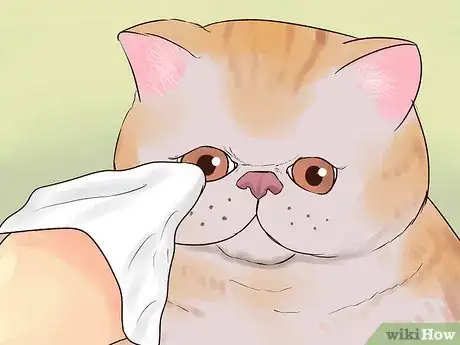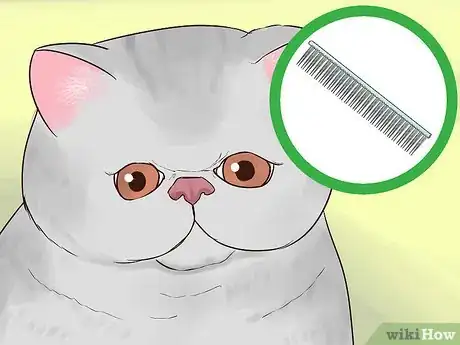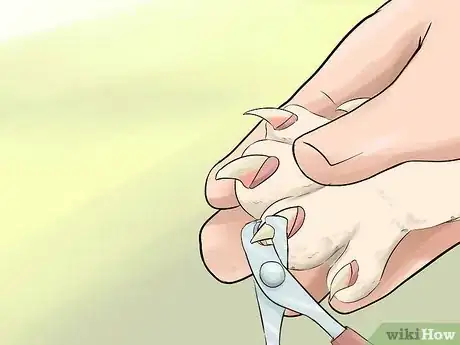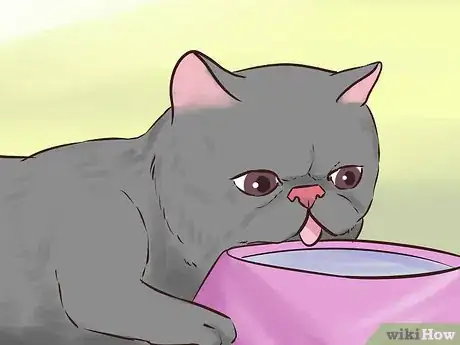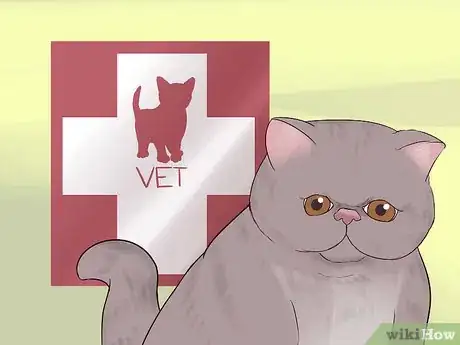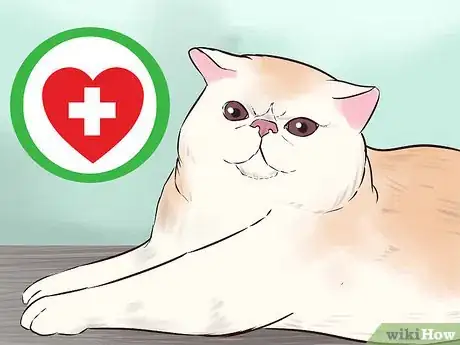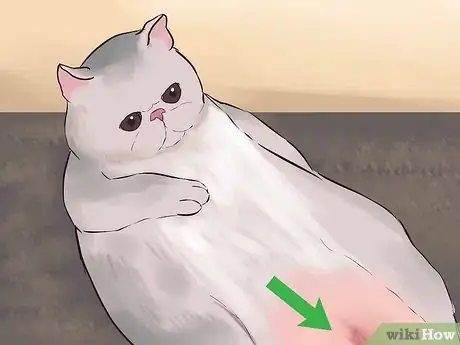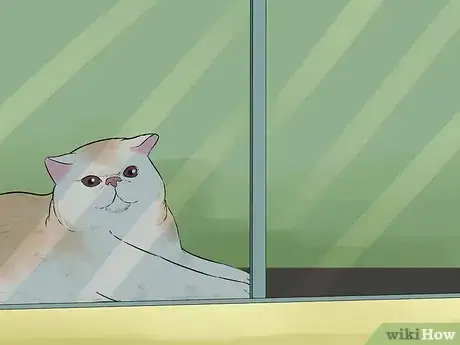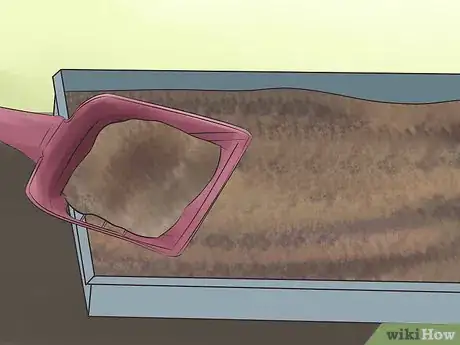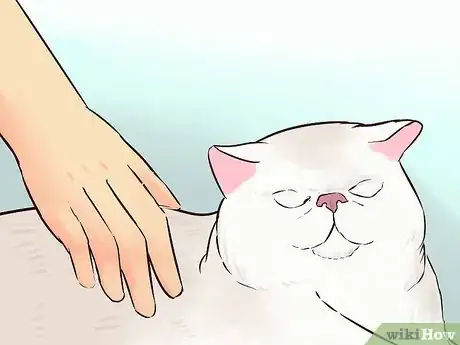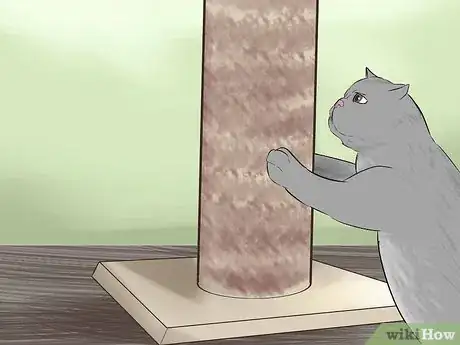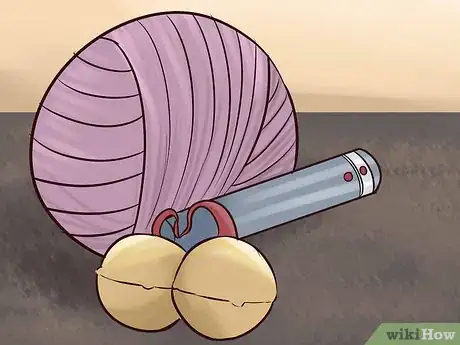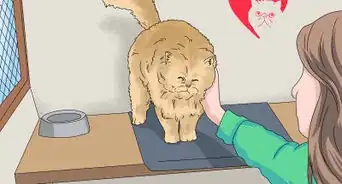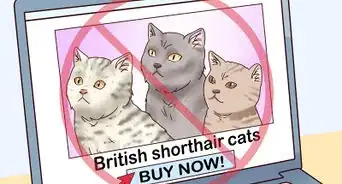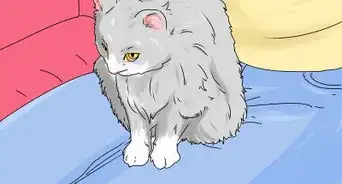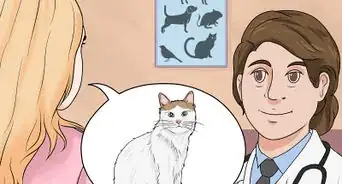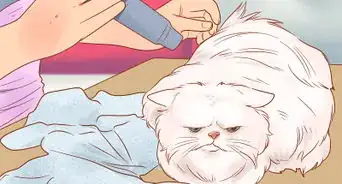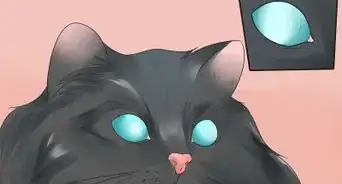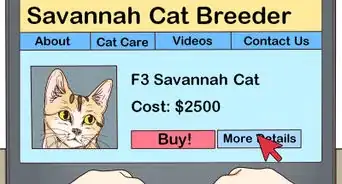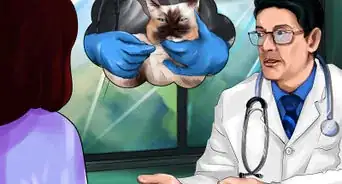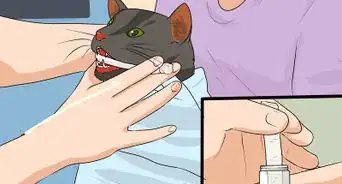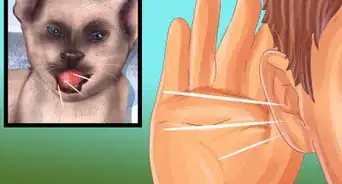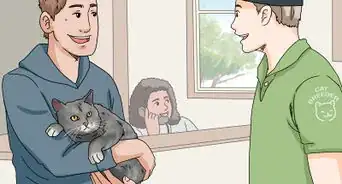This article was co-authored by Lauren Baker, DVM, PhD. Dr. Lauren Baker is a Veterinarian and Assistant Scientist at the University of Wisconsin-Madison. With over 10 years in veterinary medicine, she specializes in the concept of “one health,” which uses insights from veterinary medicine to help human medical research. She holds a Ph.D. in Comparative Biomedical Sciences, a Doctor of Veterinary Medicine, an MS in Comparative Biomedical Sciences, and a Bachelor’s degree in Psychology from the University of Wisconsin-Madison.
This article has been viewed 33,618 times.
The exotic shorthair cat breed is a mixture of a Persian cat and an American shorthair cat. It has many of the lovely looks of a Persian but a short coat that is easier to care for than that of a Persian. Even with a coat that is relatively easy to care for, the exotic shorthair does require some specialized grooming. To take proper care of an exotic shorthair, in addition to grooming you will also need to focus on keeping it healthy and happy.[1]
Steps
Grooming Your Exotic Shorthair Cat
-
1Clean your cat's eye area. An exotic's eye area can get crusty and gooey because its flat face doesn't allow for good drainage. Take a paper towel or washcloth and wet it with warm water. Then wipe around the cat's eyes. Be sure to thoroughly dry the area after wiping. If you don't do this, the discharge can stain your cat's coat and also lead to infections if the cat's eye ducts to become blocked.[2]
- You may wish to ask your veterinarian to prescribe medicated wipes, as these cats are prone to developing yeast or bacterial infections due to moisture in the skin folds on their face. A medicated wipe will help prevent this.
- While cleaning around your cat's eyes, it is a good time to inspect their eyeballs. Exotics can be prone to problems with their corneas, such as scratches or ulcers, so look at their eyes regularly to make sure that the surfaces of their eyes are smooth and there is no redness, cloudiness, or abnormal discharge that may indicate a problem.
-
2Comb your cat. Even though an exotic shorthair has shorter fur than a Persian, they still need occasional combing to keep their coats in good shape. Combing your cat while it is in a shedding cycle will help to get rid of excess hair before it is all over your house and to keep the cat from ingesting too much, which can lead to hairballs.[3]
- Use a metal long-toothed comb to comb your cat. These combs are sold at most pet supply stores.
- If your cat likes to be combed or brushed, you should do it regularly. Just because the coat doesn't require it, that doesn't mean that its not a great bonding activity and you can decrease the amount of fur that is left around your house.
Advertisement -
3Trim your cat's nails. It is important for you to trim your cat's nails regularly so that they do not get too long. Nails that are too long can be uncomfortable to walk on, can snag furniture, and the snagging can cause the nails to be ripped off. To trim your cat's nails, hold the cat's paw in one hand and the nail trimmer in your other hand. Only trim the tip of the nail. Not cutting back a lot will help you avoid cutting into the vein in the nail.[4]
- The vein is easy to spot; it will appear as a pink, triangular area in the center of the nail. Take note of where it is before you trim your cat’s nails so that you can avoid cutting them too short.
- If you are nervous about trimming your cat's nails, you can have a professional do it. Take your cat to a groomer that is experienced at working with cats or ask for someone at your veterinary office to do it when you take your cat in for an appointment.
Keeping Your Exotic Shorthair Cat Healthy
-
1Give your cat quality food. Just as with all cat breeds, giving your exotic shorthair quality cat food will make it healthier and will potentially help it to live a long life. A quality cat food consists of mostly animal tissue, as cats are strictly carnivores. Look at the ingredient list and make sure the food you choose has animal tissues, such as seafood or meat byproducts, as the first couple of ingredients. This will help assure that you are feeding your cat mostly animal tissue.
- In addition to the ingredients list, make sure that the food you choose is made for your cat's age. Food that is made for kittens, adults, and senior cats is formulated for the specific nutritional needs of those periods of life.
- In addition to animal tissue, commercial foods may have added vitamins and minerals to give the cat proper nutrition.
- Choosing between dry, semi-moist, and wet cat food is largely based on what your cat likes. However, wet cat food can be a great source of water for a cat that does not drink a lot of water.
-
2Make sure the cat has access to water. Cats should have constant access to cool, clean water. They may not drink it constantly but they should have access to it in case they need it.
- Many cats are enticed to drink running water. Giving your cat a drinking fountain, which are specialty cat products that recycle a stream of water constantly, may help it to stay hydrated.
- If your cat is dehydrated and does not want to drink water, consider feeding it wet food. This can give it some vital water.
-
3Get the cat annual veterinary care. Once you bring home an exotic shorthair cat you should get it checked out by a veterinarian right away. After that, take your cat in for an annual exam. Also, if it has a medical emergency or seems ill, take it in to be checked out by a veterinarian immediately.
- Having an annual exam will allow your veterinarian to spot any potential health problems that may be arising. It will also assure that you are staying up to date on preventative veterinary care, such as vaccinations, that need to be given on a regular basis.
-
4Have your cat assessed for common health problems. There are some health problems that exotics commonly have. These include problems with their eyes, respiratory system, kidneys, and the heart. Have your cat screened for these specific problems:[5]
- Polycystic kidney disease (PKD)
- Respiratory problems
- Progressive retinal atrophy (PRA)
- Hypertrophic cardiomyopathy
-
5Spay or neuter your cat. In an effort to limit pet populations and to keep your cat healthy, it is important to get it spayed or neutered. Desexing your cat can stop a lot of unwanted behavior, such as spraying or roaming. In female cats it can also reduce their chance of developing mammary cancer later in life.
- Discuss when your cat should be spayed or neutered with your veterinarian. In general, it should be done at between three months and six months of age.
-
6Keep your cat indoors. There are a wide variety of dangers outside that can be hazardous to your cat's health. These include cars, diseases, parasites, toxins, and other animals. To avoid these hazards, it's best to just keep your cat inside.[6]
- Not only does keeping the cat indoors increase its life expectancy, it is good to keep cats inside to protect wildlife, namely native birds.
- Because exotics are not very active cats, most do not mind staying inside. However, you will need to provide enrichment for them, such as toys and viewing platforms that stimulate their minds.
Creating a Nurturing Environment
-
1Clean the cat's litter box regularly. Keeping your cat happy and healthy will require that you give it a clean and tidy place to go to the bathroom. This means that you should clean the cat's litterbox daily and use a type of litter box and litter that the cat likes.[7]
- If you do not supply a clean and appealing litter box, your cat may choose to go to the bathroom in other places in your home.
-
2Spend time with your cat. In order to take proper care of your cat, you will need to give it love and attention. Spend time with it when it comes to you for affection or attention. With an exotic shorthair, you will likely know they want attention when they walk up to you and request it. The time you spend with them can be spent petting them or playing games with them.
- Exotic shorthair cats can be playful and active at times but they are not this way all of the time. Much of their time is spent on their own and most exotic shorthairs will not shadow you constantly like some other breeds.
-
3Give the cat a scratching surface. It is natural for cats to want to scratch. The key is to give them proper surfaces to do it on. Having a scratching post or scratching pad in each room that the cat spends time in will help to keep it from scratching inappropriate surfaces, such as your furniture.[8]
- You may need to protect your furniture from scratching if your cat has decided it doesn't want to use its scratching post. There are a variety of products that can help you do this, such as sprays that can be applied to furniture that are repellent to cats.
- Keeping your cat’s nails trimmed will also help prevent damage due to scratching.
-
4Give the cat enrichment toys and equipment. While an exotic shorthair cat does not usually need constant entertainment, it is important to provide them with mental stimulation. Give your cat a variety of toys it can chase and play with. These could include bell balls, fabric mice, laser toys, or strings or puff balls.[9]
- Additionally, make sure it has access to a window where it can look outside. This will allow the cat to get stimulation from looking at everything going on outside.
- If your cat seems bored with its toys, rotate through them. Put a few away for a month or so then switch the toys out.
Expert Q&A
-
QuestionHow can I treat my cat for an ulcerated lip?
 Lauren Baker, DVM, PhDDr. Lauren Baker is a Veterinarian and Assistant Scientist at the University of Wisconsin-Madison. With over 10 years in veterinary medicine, she specializes in the concept of “one health,” which uses insights from veterinary medicine to help human medical research. She holds a Ph.D. in Comparative Biomedical Sciences, a Doctor of Veterinary Medicine, an MS in Comparative Biomedical Sciences, and a Bachelor’s degree in Psychology from the University of Wisconsin-Madison.
Lauren Baker, DVM, PhDDr. Lauren Baker is a Veterinarian and Assistant Scientist at the University of Wisconsin-Madison. With over 10 years in veterinary medicine, she specializes in the concept of “one health,” which uses insights from veterinary medicine to help human medical research. She holds a Ph.D. in Comparative Biomedical Sciences, a Doctor of Veterinary Medicine, an MS in Comparative Biomedical Sciences, and a Bachelor’s degree in Psychology from the University of Wisconsin-Madison.
Veterinarian If your cat has an ulcerated lip, there is something underlying it that has caused the injury. It may be something benign and easily treatable, like a bacterial infection or allergy. Unfortunately, an ulcerated lip could also be a sign of kidney disease or cancer (squamous cell carcinoma). You need to have your cat evaluated by a veterinarian right away to make sure it is not something serious.
If your cat has an ulcerated lip, there is something underlying it that has caused the injury. It may be something benign and easily treatable, like a bacterial infection or allergy. Unfortunately, an ulcerated lip could also be a sign of kidney disease or cancer (squamous cell carcinoma). You need to have your cat evaluated by a veterinarian right away to make sure it is not something serious.
References
- ↑ http://cfa.org/Breeds/BreedsCJ/Exotic/ExoticArticle.aspx
- ↑ http://purfurvid.com/exotic_persian_cat_care.html
- ↑ http://purfurvid.com/exotic_persian_cat_care.html
- ↑ http://purfurvid.com/exotic_persian_cat_care.html
- ↑ http://www.pethealthnetwork.com/cat-health/cat-breeds/exotic-shorthair
- ↑ http://cfa.org/Breeds/BreedsCJ/Exotic.aspx
- ↑ http://www.petmd.com/cat/care/litter-box-training-why-setup-and-placement-matters
- ↑ http://cfa.org/Breeds/BreedsCJ/Exotic.aspx
- ↑ https://www.americanhumane.org/fact-sheet/indoor-cats-vs-outdoor-cats/
About This Article
To take care of your exotic shorthair, you’ll need to comb it regularly with a metal long-toothed comb, which will keep its coat healthy. You should also clean its eye area regularly with a wet washcloth to clear away discharge that can easily build up and cause an infection. In addition to grooming your cat, make sure to feed it a quality cat food that’s high in protein so it gets the nutrition it needs. Additionally, since cats can easily get dehydrated, you may consider getting your shorthair wet cat food or a semi-moist food formula. To learn how to provide a nurturing environment for your shorthair, read more from our Veterinary co-author!
